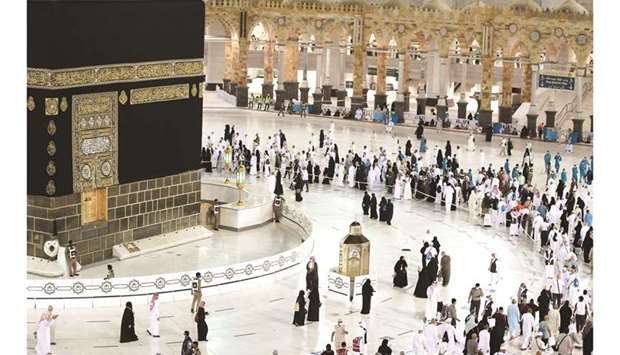From first light, small groups of pilgrims made their way across the Valley of Mina near Makkah in western Saudi Arabia to symbolically humiliate the devil at the Jamrah al-Aqaba mosque.
Wearing masks and the ihram, the pilgrim’s seamless white garment, they each threw seven stones at a pillar symbolising Satan, taking them from sealed bags provided by the authorities.
“All my life I dreamt of going on the Haj, and I still can’t believe that the dream has come true,” 38-year-old Syrian pilgrim Lina said, describing it as “the happiest day of my life”.
Yesterday, crowds were sparse and there was only a light security presence.
The pandemic has for a second year forced Saudi authorities to dramatically downsize the Haj and just 60,000 fully vaccinated citizens and residents of the kingdom are taking part — up from 10,000 last year.
“From the beginning, our priority has been the safety of pilgrims, and for this reason we decided to limit their numbers to 60,000 to ensure that the precautions are enforced and everyone is safe,” Saudi Health Minister Tawfiq al-Rabiah said.
“We are monitoring the situation continuously,” he said late Monday, adding that not a single case of coronavirus had been detected so far among pilgrims.
The Haj is usually one of the world’s largest religious gatherings, with 2.5mn taking part in 2019.
“If we can guarantee that there will be full control (of Covid) and ensure the safety of pilgrims too, which is a priority for the kingdom and its leaders, the Haj can happen again in the future as it was before,” the health minister said. After the stoning ritual, pilgrims return to the Grand Mosque in Makkah to perform a final “tawaf” or circling of the Kaaba.
State media said that an army of 3,500 workers was tasked with sterilising the Grand Mosque ten times a day to prevent any spread of infection.
This year’s Haj is being held at a time when new variants of the virus are causing global concern.
Saudi Arabia has recorded more than 510,000 cases of coronavirus including 8,089 deaths.
The participants were chosen in a lottery among 558,000 Saudi residents and nationals, who had to be between 18 and 65 years old, vaccinated and free of chronic diseases. All the workers mobilised for the Haj have been fully vaccinated as well, authorities say.
Custodian of Two Holy Mosques King Salman said Monday in a televised speech that “the kingdom’s efforts to limit the effects of the coronavirus have been successful.”
The strict preventive measures “have enabled pilgrims to perform the Haj,” he added.

A Muslim pilgrim casts stones at a pillar symbolising the devil during the annual Haj pilgrimage, in Mina, near the holy city of Makkah, yesterday.



